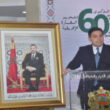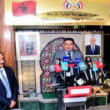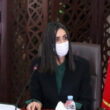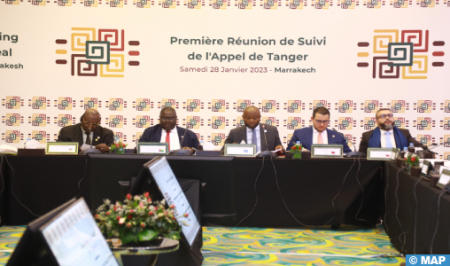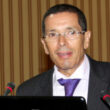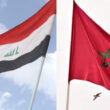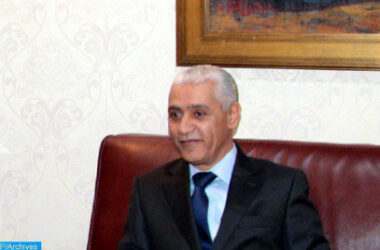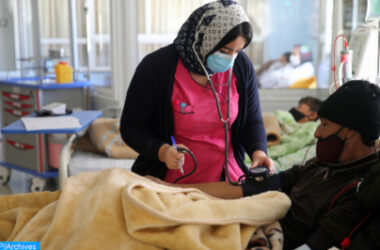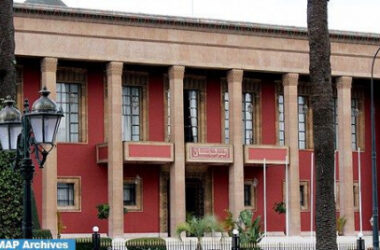This legal and political reference document, duly argued, allows to efficiently equip the “Contact Group”, acting on behalf of the signatories during the next advocacy phase of this Pan-African Campaign.
The “White Paper” is the culmination of the intellectual phase of the Campaign and a faithful reflection of the debates held. Its added value lies in its co-construction process mobilizing various African stakeholders. It is also the materialization of a vision, that of a united Africa, that of a renewed Pan-Africanism, far from the ideologies of another time, and carried by the living forces of the Continent.
Adopting the multidimensional approach that characterizes this Pan-African Campaign, the “White Paper” objectively analyzes the political, legal, economic, security and institutional repercussions of the aberrant presence of this non-state entity within the African Union on Pan-Africanism and on the Unity of the Continent.
This document develops an irrefutable factual and legal argument, relying in particular on the contradictions inherited from a manifest partiality of the Organization of African Unity (OAU) and then of the AU, in the treatment of the Moroccan Sahara issue.
In the wake of the conclusions of the five sub-regional seminars and the Tangier Round Table, the “White Paper” emphasizes the concrete solutions available to the AU, in order to definitively rebalance its position on the Sahara issue and thus be able to effectively support, in all impartiality and legitimacy, the exclusive UN process.
The solution of the definitive suspension, exclusion or expulsion of the so-called “sadr” from the AU, having unanimously emerged during the Pan-African Intellectual Campaign, as an indispensable prerequisite for the return of the AU’s impartiality and credibility on the Sahara issue – far from any form of manipulation or manifest bias – is a necessity in order to consolidate the Unity of the Continent and to protect it from the divisions linked to the growing separatist threats.
This solution, the regulatory modalities of which were set out in the “White Paper”, because it converges with the need to serenely re-engage the AU in its role as an active, credible and impartial supporter of the UN, in accordance with the spirit and the letter of Decision 693, should not be considered a taboo or an unattainable objective.
Its realization, which is part of a favorable dynamic, where realism and pragmatism prevail, is not only Morocco’s ambition, but also that of all African states wishing to put an end to unnecessary divisions and to the permanent exploitation of an organization that serves a pan-African purpose and ideal.
The “White Paper” identifies ten factual considerations justifying the need for the AU to initiate, as soon as possible, the final suspension, exclusion or expulsion of the “sadr”.
First, the so-called “sadr” imposed on the OAU/AU alone, is not a state entity since it does not possess any of the qualifying and commonly accepted attributes of an independent and sovereign state (a territory, a population and an effective government).
In addition, the so-called “sadr”, based in Algerian territory, is subject to a higher sovereignty, that of Algeria. However, the “sadr”, which is ineffective because it is subject to a higher sovereignty, is the only member of the AU over which the sovereignty of another member of the same organization is exercised.
Moreover, the so-called “sadr” is a non-state entity with no international legal responsibility. The so-called “sadr”, which is not a party to any international legal instrument or convention outside the sole framework of the AU, cannot itself contest or be the subject of a dispute, or even request arbitration.
The admission of the “sadr” to the OAU is a legal power grab in blatant violation of its Charter and a shameless attempt to pervert the condition set out in its Article 4 regarding the membership of “any independent and sovereign African state”.
Its continued membership in the AU contravenes the principles set out in Articles 3 and 4 of its Constitutive Act.
Similarly, the admission of the “sadr” to the OAU took place in a particular context, at a time when the continent was in the grip of various ideological currents that are now obsolete.
This context and the fundamental change in circumstances that resulted from its evolution were recognized by the majority of AU member states that signed the Kigali motion.
By admitting the “sadr”, the OAU prejudged, in all partiality, the outcome of a process described as a “regional solution”, of which it was the guarantor, and which did not reach its conclusion because of this admission.
The referendum option, favored by the OAU and then tested for a time by the UN, has proved to be inapplicable and inappropriate in the case of the Sahara.
Moreover, the presence of the “sadr” within the OAU and then the AU has distanced the organization from dealing with the Sahara issue and hinders its effectiveness, legitimacy and credibility in providing effective support to the UN process, which has rejected the referendum option for the past 20 years and which, since April 2007, has emphasized the pre-eminence of the Moroccan autonomy proposal.
Decision 693 taken by the AU at the Nouakchott Summit in July 2018 attests to the exclusivity of the UN process in the search for a “just, lasting and mutually acceptable political solution” and invites, in fact, the Pan-African Organization to espouse the position of the United Nations expressed through the relevant resolutions of the Security Council, especially since April 2007 and the definition of new parameters for the settlement of this regional dispute.
The so-called “sadr”, which is ineffective because of its non-state nature, does not add any value to the AU and is a source of division rather than unity.
On the contrary, it hinders the effectiveness and smooth functioning of the pan-African organization, while disrupting the smooth running of meetings, conferences and bi-regional summits between the AU and its international partners.
Finally, the presence within the AU of the so-called “sadr”, a non-state emanation of an armed separatist group, illustrates the institutional vulnerability of the Organization, represents an undeniable brake on regional and continental economic integration, and, because it is the expression of a form of apology for bellicose separatism, it contributes to a constant threat of destabilization of the Maghreb and of undermining regional security within the pan-African institution and its main bodies.


